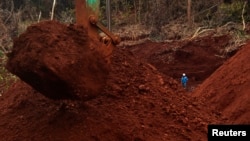WASHINGTON —
Mineral-rich Indonesia is trying to create more jobs in its huge mining sector. Jakarta wants more of the work of turning raw ore into finished metal to be done inside the country, so it is limiting exports of unprocessed ore. The idea is to encourage local construction of smelters and create jobs for Indonesians.
Indonesia is one of the world's largest producers of the ores that yield gold, nickel, copper and tin.
Ships loaded with raw materials go to other nations for the complex process of refining or smelting.
The process uses heat and chemicals to free the metal from the surrounding rock, and get rid of impurities like oxygen or sulfur. Indonesia wants more of that work, and the jobs that go with it, to be kept at home.
With that in mind, Jakarta first said it would ban exports of unprocessed ore, to encourage companies to build smelters in Indonesia and hire local people to run them. That policy has been modified to allow exceptions and more time.
Maria Toyoda, a professor at Villanova University in Philadelphia who researches Asian economies, said it is very difficult to predict what an export ban would do. “It is a real gamble for Indonesia”
She said the policy might work, but it also could have the opposite effect and hurt Indonesia by discouraging foreign investment.
Trade expert Gary Hufbauer of the Peterson Institute for International Economics said export bans or restrictions are used for many purposes by many nations, including the United States and India. He called it a “bad policy” that hurts trade, and a “sledgehammer” [excessively strong] tactic.
“If there were a good economic case for building these refineries [smelters] in Indonesia, it would have been done already,” he said.
Hufbauer said Indonesia would be more likely to create jobs by improving roads, ports and the electric grid, while cutting taxes and corruption.
He once lived in Indonesia and said he thinks there would be more jobs if it was easier to fire people who don’t perform, or to lay off workers when demand falls.
“Hiring somebody [under Indonesia’s rules] is almost like marrying that person,” said Hufbauer.
The managing director of Ellice Consulting in London, James Berkeley, said Indonesia’s policy changes could raise metal prices in the short term, and make metal markets more volatile in the long run.
“Prices will travel in a significantly higher and also lower range than they have in the past year,” he said.
Berkeley said the odds are no greater than “50-50” that the policy will bring new jobs.
Indonesia is one of the world's largest producers of the ores that yield gold, nickel, copper and tin.
Ships loaded with raw materials go to other nations for the complex process of refining or smelting.
The process uses heat and chemicals to free the metal from the surrounding rock, and get rid of impurities like oxygen or sulfur. Indonesia wants more of that work, and the jobs that go with it, to be kept at home.
With that in mind, Jakarta first said it would ban exports of unprocessed ore, to encourage companies to build smelters in Indonesia and hire local people to run them. That policy has been modified to allow exceptions and more time.
Maria Toyoda, a professor at Villanova University in Philadelphia who researches Asian economies, said it is very difficult to predict what an export ban would do. “It is a real gamble for Indonesia”
She said the policy might work, but it also could have the opposite effect and hurt Indonesia by discouraging foreign investment.
Trade expert Gary Hufbauer of the Peterson Institute for International Economics said export bans or restrictions are used for many purposes by many nations, including the United States and India. He called it a “bad policy” that hurts trade, and a “sledgehammer” [excessively strong] tactic.
“If there were a good economic case for building these refineries [smelters] in Indonesia, it would have been done already,” he said.
Hufbauer said Indonesia would be more likely to create jobs by improving roads, ports and the electric grid, while cutting taxes and corruption.
He once lived in Indonesia and said he thinks there would be more jobs if it was easier to fire people who don’t perform, or to lay off workers when demand falls.
“Hiring somebody [under Indonesia’s rules] is almost like marrying that person,” said Hufbauer.
The managing director of Ellice Consulting in London, James Berkeley, said Indonesia’s policy changes could raise metal prices in the short term, and make metal markets more volatile in the long run.
“Prices will travel in a significantly higher and also lower range than they have in the past year,” he said.
Berkeley said the odds are no greater than “50-50” that the policy will bring new jobs.




